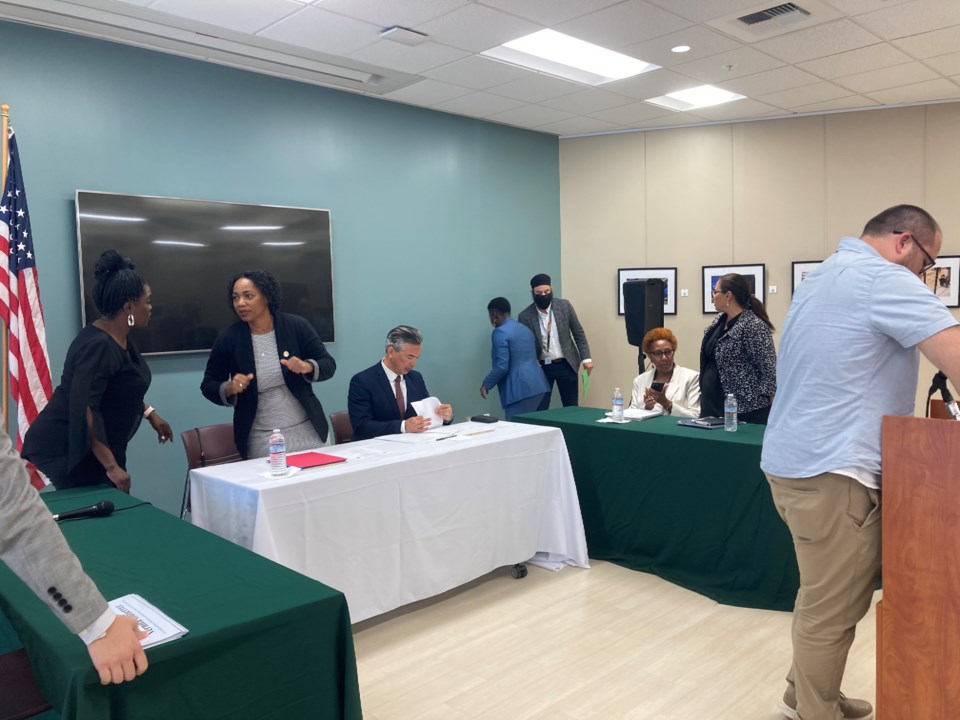Assemblymember Akilah Weber, D-La Mesa, held a discussion roundtable with Attorney General Rob Bonta and other officials on the topic of Reproductive Justice.
This roundtable was organized in the wake of the recent leak that indicates that the nation's Supreme Court could soon abrogate Roe v. Wade, and do away with the constitutional right of a woman's right to legal abortion.
And just last week, The Washington Post published a story reporting that “as of last week, the five-member majority to strike Roe remains intact, according to three conservatives close to the court.”

The discussion was recently held at the Skyline Hills Library here in San Diego, in a roundtable that also included Vernita Guitierrez (Vice President of External Affairs at Planned Parenthood Of The Pacific Southwest), Norma Chávez-Peterson(Executive Director, ACLU San Diego & Imperial Counties), and Suzanne Afflalo (Medical Director, Alliance Health Clinic).
Each official on the roundtable made one thing loud and clear in this discussion: The state of California will lead the way by becoming a safe haven for women seeking safe abortions.
Attorney General Rob Bonta says that if the Supreme Court follows through with this probable decision, the country will be regressing five decades of progress involving this constitutional case law.
“As some seek to roll back 50 years of progress, 50 years of settled constitutional case law, we will move forward here in California,” the Attorney General said at the roundtable. “We will expand access to health care, we will expand access to abortion, we will meet this moment and we will lead this country as we have done so often.”
The news of the draft opinion hit home in particular for Assemblymember Akilah Weber, who is devastated by the potential reversal of Roe v. Wade, as Black women have worse maternal health rates in the country due to a lack of access to health care and lower salary rates.
In fact, according to the U.S. Centers for Disease Control and Prevention, the death rates of Black women dying in childbirth are three times higher than of Caucasian women.
Dr. Weber says that she is the accomplished medical and political official she is today in large part due to her ability to choose when to give birth in her life. And now, she fears that millions of women won't have that same constitutional right going forward if Roe v. Wade were to be reversed by the Supreme Court.
“They will not have the choice to wait until they are done with their education, or wait until they are in a financial position to care for a child, or wait until they are in a safer environment, free from domestic or sexual abuse, or wait until they are mentally ready to care for another, or medically stable to withstand the physical demands pregnancy places on one’s body,” said Dr. Weber.
Vernita Gutierrez, who is vice president of external affairs for Planned Parenthood of the Pacific Southwest, said that their organization's Action Fund will continue providing, and even expanding, access to safe reproductive health care and sexual education.
However, Gutierrez still fears for women of marginalized communities who are at more risk in the outcome of this law reversal.
“People with the means will always be able to access abortion,” Gutierrez said. “It’s the folks who already struggle to access basic health care, to put food on the table, to afford child care, those are the folks who are going to most hurt. Black people, indigenous folks, people of color, immigrants, young people, LGBTQ folks, those will be the folks who suffer the most as the result of this decision,” she added.



